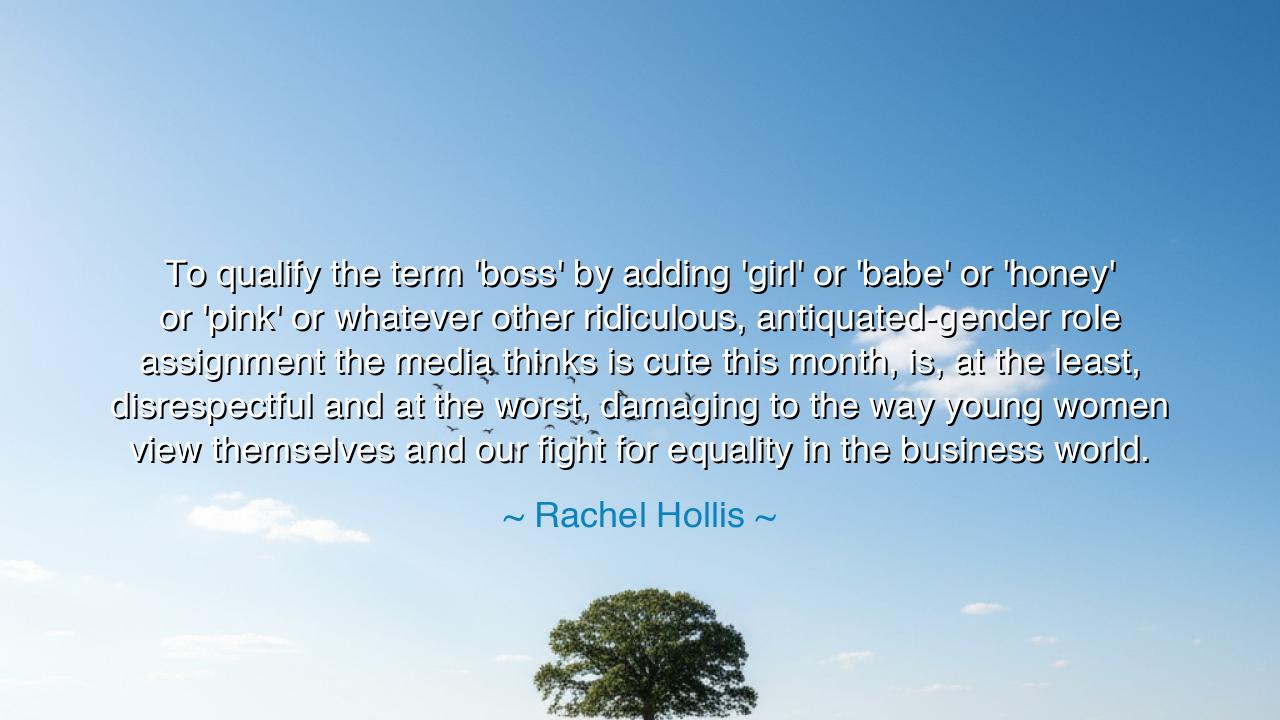
To qualify the term 'boss' by adding 'girl' or 'babe' or 'honey'
To qualify the term 'boss' by adding 'girl' or 'babe' or 'honey' or 'pink' or whatever other ridiculous, antiquated-gender role assignment the media thinks is cute this month, is, at the least, disrespectful and at the worst, damaging to the way young women view themselves and our fight for equality in the business world.






"To qualify the term 'boss' by adding 'girl' or 'babe' or 'honey' or 'pink' or whatever other ridiculous, antiquated-gender role assignment the media thinks is cute this month, is, at the least, disrespectful and at the worst, damaging to the way young women view themselves and our fight for equality in the business world." These words from Rachel Hollis speak directly to the heart of a problem that has persisted through the ages—the demeaning of women’s authority and leadership by reducing them to simplistic, outdated labels. The addition of terms like 'girl', 'babe', or 'honey' when referring to a woman in a position of power is not just trivial, it is an affront to the progress that has been fought for over centuries. It is a subtle yet harmful reinforcement of the notion that women are not equals in the professional world, that their authority is somehow less than that of their male counterparts.
In the ancient world, women were often denied positions of power and influence, their worth confined to domestic roles, and their contributions to society undervalued. Cleopatra, Queen of Egypt, was one of the few who broke through these limitations, wielding immense power and influence on the world stage. But even she, though a ruler, faced resistance simply because of her gender. Her leadership was often questioned, and her authority undermined by those who saw a woman in power as unnatural or inappropriate. Despite this, Cleopatra navigated a world dominated by men and secured her place in history not by conforming to these labels, but by commanding the respect of her contemporaries. Rachel Hollis echoes this struggle, urging modern women to reject the infantilizing labels placed upon them and demand the respect that their achievements merit.
The problem, as Hollis highlights, lies in the harmful implications of these gendered labels. To call a female boss a “girl boss” or “babe” is to suggest that her authority is somehow more playful, more fragile, and less deserving of respect than that of a man in the same position. This undermines the seriousness of her role and diminishes the value of her leadership. It creates a dangerous precedent, particularly for young women, who are led to believe that they must play into this stereotype in order to succeed. The message is clear: you can be powerful, but only if you conform to this narrow and infantilized version of womanhood. This diminishes their potential and sends the message that leadership in a woman must be "softened" or "cutified" to be palatable.
Consider the struggle of Susan B. Anthony, who, like many women before and after her, fought tirelessly for the right to vote. Anthony, in the face of overwhelming opposition, was treated with derision, often infantilized or dismissed because of her gender. The labels used against her were not as seemingly innocuous as ‘girl boss,’ but they were equally demeaning—labels that reduced her to a distraction, rather than recognizing her as the serious advocate she was. Yet, through it all, Susan B. Anthony persisted. She did not accept the limitations placed upon her by a society that refused to see her as an equal. Her refusal to be diminished by the stereotypes of her time helped change the course of history.
Rachel Hollis’s words are not merely a critique of contemporary media—they are a call to arms. Women today stand on the shoulders of those like Susan B. Anthony, Cleopatra, and many others who fought for the right to be taken seriously in the world. These women, who achieved remarkable feats despite being trapped by their society’s limitations, demonstrated the importance of self-respect and self-worth. They demanded recognition not by conforming to the expectations placed upon them, but by asserting their value and leading with integrity. To diminish their legacy with infantilizing labels is to disrespect their very struggle and undermine the progress they fought so hard to achieve.
The lesson here is not just about rejecting labels but about claiming the space that is rightfully yours. It is about standing firm in your leadership, regardless of the labels society attempts to place upon you. Hollis challenges us to ask: What does it mean to be a leader? Is leadership defined by your gender, or is it defined by your actions, your vision, and your ability to inspire and move others toward a greater good? Leadership should never be diminished by the labels we place on people—it should be recognized by the qualities of strength, vision, and impact that define it.
So, future generations, let this wisdom guide you: Do not allow yourself or others to be diminished by labels that deny dignity and respect. Whether you are in a position of leadership or support, recognize that your worth is not contingent on how society chooses to frame you. Reject the labels that seek to infantilize or undermine your power. Stand proudly in your truth, your worth, and your leadership. Lead with integrity, and never let society’s outdated expectations shape who you are or the vision you seek to create. In doing so, you will not only honor those who fought before you but pave the way for those who will come after you to inherit a world where equality, respect, and dignity reign.






AAdministratorAdministrator
Welcome, honored guests. Please leave a comment, we will respond soon